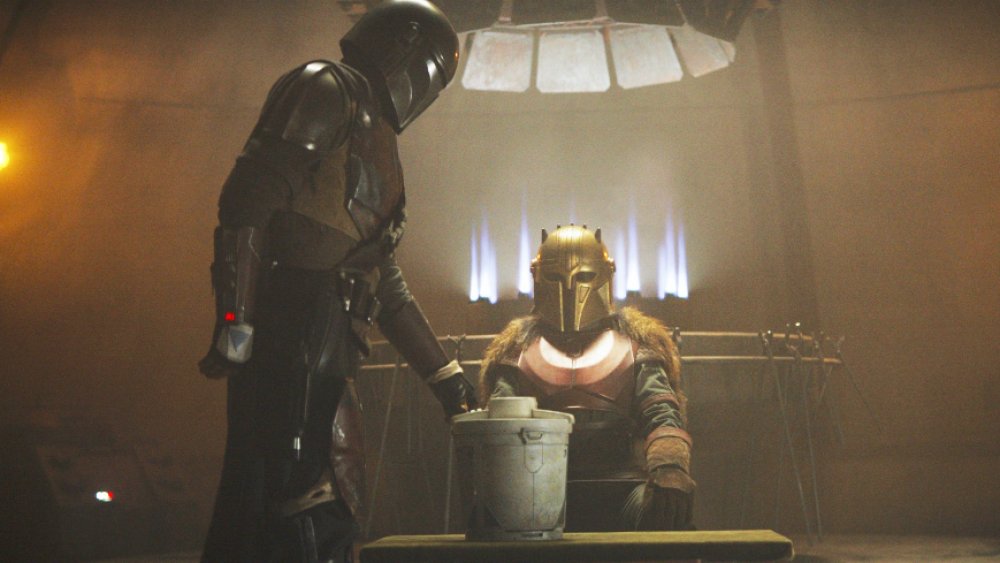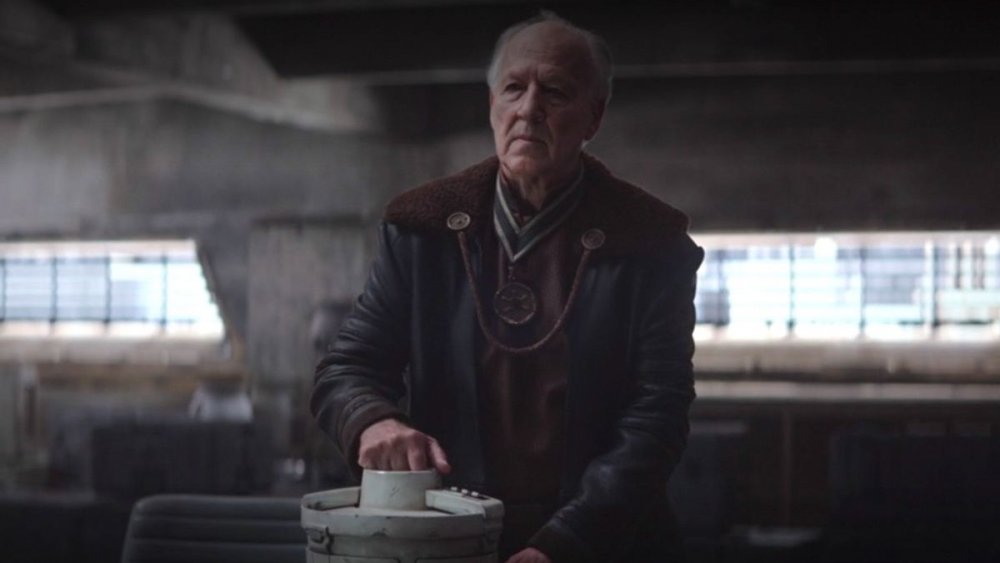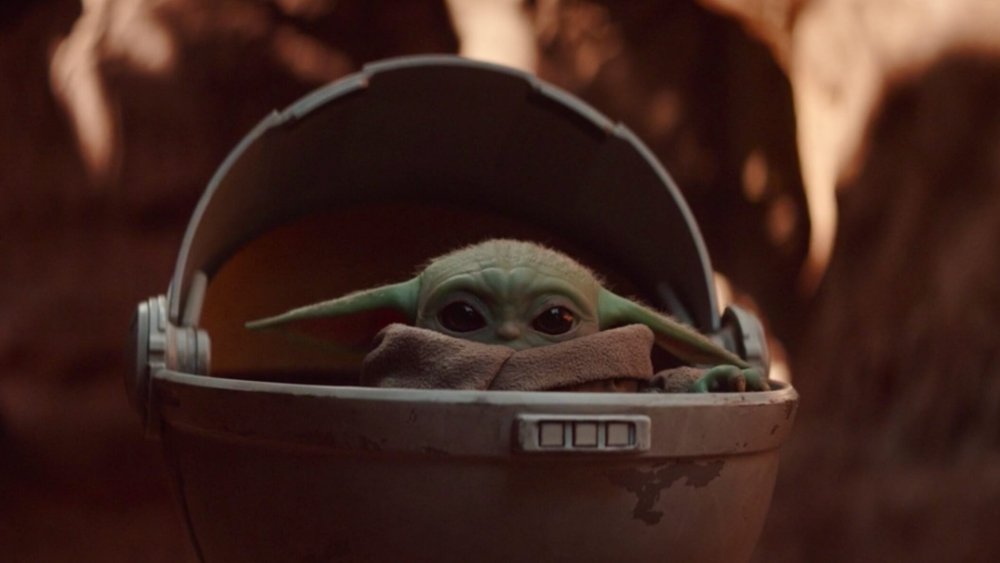The Ending Of The Mandalorian Chapter 3 Explained
Contains spoilers for The Mandalorian chapters 1 through 3
Hoo boy, Mando's in a spot of trouble now.
The Mandalorian chapter 3 offered the most explosive, action-filled scenes seen on the live-action Star Wars series yet, and with the newest episode, it feels as though we've departed from prologue to truly be off and running at last. After watching Mando clearly feel bothered and conflicted by dropping off Baby Yoda in exchange for all that succulent Beskar steel, he does the Grey Hat Cowboy Archetype thing we were all waiting for: busts in to steal the baby back and kill his way out again — after he gets sick new full-body armor from his delightful lady-Mandalorian blacksmith, of course.
The episode ended on a massive one-against-dozens gunfight in the spaceport square, like it was a drunken Saturday night in some two-horse dust town in 1881. When Mando is at his lowest, stuck in cover with no apparent means of escape, the rest of the Mandalorian enclave appears at the last second to help him get to his ship and get Baby Yoda off world. That might be done, but neither of them are safe — and if his usual spaceport is razed and the Mandalorian enclave scattered because of his actions, the only thing to ask is what now?
What does The Client want?
At the end of chapter 3 of The Mandalorian, we see The Client (Werner Herzog) speak with Dr. Pershing (Omid Abtah) just before Mando (Pedro Pascal) bombs his way into the compound, and yet has already disappeared by the time he makes it to Baby Yoda. Evil Werner Herzog clearly anticipates an attack, as he says he can no longer guarantee the doctor's safety. Is this because he knows the Mandalorian is compromised after being asked what will happen to Baby Yoda, or that having the child at all destroys their safety? Either way, he appears to have mostly acted as a financial and practical facilitator for Dr. Pershing. Sharp-eyed fans have noticed that the doctor has a patch on his sleeve that suggests he works for the clone-manufacturing world of Kamino, primarily featured in Attack of the Clones.
Dr. Pershing's interest in cloning Baby Yoda can easily be just for the sake of it; Kamino's scientists burned through thousands of failed clones just trying to get Jango Fett's clone prototype right. We don't know exactly where Herzog's character sits in Empire hierarchy, but he looks more like a former senator than a military officer like Grand Moff Tarkin — his outfit is strikingly similar to Palpatine's senatorial robes from the Star Wars prequels. No Imperial figurehead is going to do anything for free, much less something so obviously dangerous.
So what's The Client's true desire here? Though small, a creature from Yoda's species has importance in its sheer Force sensitivity. Perhaps the Empire is keen on returning to the concept of a clone army, but as a cavalcade of Force users like a cruel inversion of the Jedi Order, which would be very effective in overturning the power of the New Republic. The Client is interested in restoring "the natural order of things after a period of disarray" per his words on the first episode of The Mandalorian, after all. His sinister piece is not yet done, and we will probably see him again.
What does Mando want?
Asking what Mando really wants might seem on its face to be a silly question, but it's more complex than it sounds.
The Mandalorian chapter 1 pre-established that Mando is very suspicious of the Empire, despite its being scattered to the four winds: he won't take Imperial Credits as payment, to the point where he'll accept being paid less for his work. It's simple enough to say he took the Baby Yoda job both because he was desperate for cash and was in too deep to back out gracefully once he was aware that a representative of the Empire was the actual client. The Empire is responsible for what the Mandalorian blacksmith ominously refers to as "the purge," so that's a whole lot of incentive to not like the Empire right away. Thus, it makes sense why Mando would ask obviously impertinent questions of both his client and his broker as to what will happen to Baby Yoda now he's handed it over.
However, disliking the Empire and being willing to start a one-man war over an infant is something altogether different. As far as we know from the information we've been given so far, Mando may have nowhere to go from here. (Of course, The Mandalorian will probably reveal that he does, but we just don't know for certain after chapter 3.)
Mando's motivation isn't as easy as saving a life — he appears to be disinterested in being a hero for a cause and is acting on almost selfish whims. Mando clearly cares about Baby Yoda; he's invested in its safety beyond just getting his cash and taking off, and permits it to play with his stuff. He doesn't quite talk to the baby conversationally, but he does interact with it in an emotional way.
When speaking with the blacksmith, however, Mando refers to the baby as his enemy. He declines taking a sigil in the form of the mudhorn he fought during The Mandalorian episode 2 because he didn't kill it without the assistance of "an enemy," and goes on to say that the one who assisted him was unaware that they were enemies. Whoa, buddy — that's a whole lot to unpack. Baby Yoda isn't just a faceless bounty, but an enemy. Surprising, but hey, enemies require emotional investment, too.
This all raises several questions: What's Mando looking for? Is the baby still his enemy, and is he invested in creating a relationship with it that's non-adversarial? Evidence suggests the latter, since he shot up a whole town to save Baby Yoda's life. His Mandalorian kin came to his rescue, too. It's all very much a familial excursion, implying that while they probably don't understand what Mando is doing and why, they'll support him and trust he's acting in accord with their version of honor.
During The Mandalorian chapter 3, the audience was also treated to another extended flashback of Mando's family being lost in what appears to be the Clone Wars. Mando refers to himself as a Foundling, and he tells the blacksmith to reserve some of his bounty reward for other Foundlings' benefit. Does this mean Mando sees Baby Yoda the same way — as a Foundling to protect? Does Mando want a real family? Is he even aware that his investment is so emotional and, frankly, irrational? A substantial proportion of the scummiest citizens in the sector are going to be after him now because of all this.
But just because we can tell Mando has caught feelings doesn't mean he can. Maybe he thinks he's acting in an unspecific best interest by keeping something so obviously important out of the hands of the Empire. This poor idiot son of ours has a whole lot to sort out for himself while he's on the run. Hopefully he'll get his ducks in a row come chapter 4.


